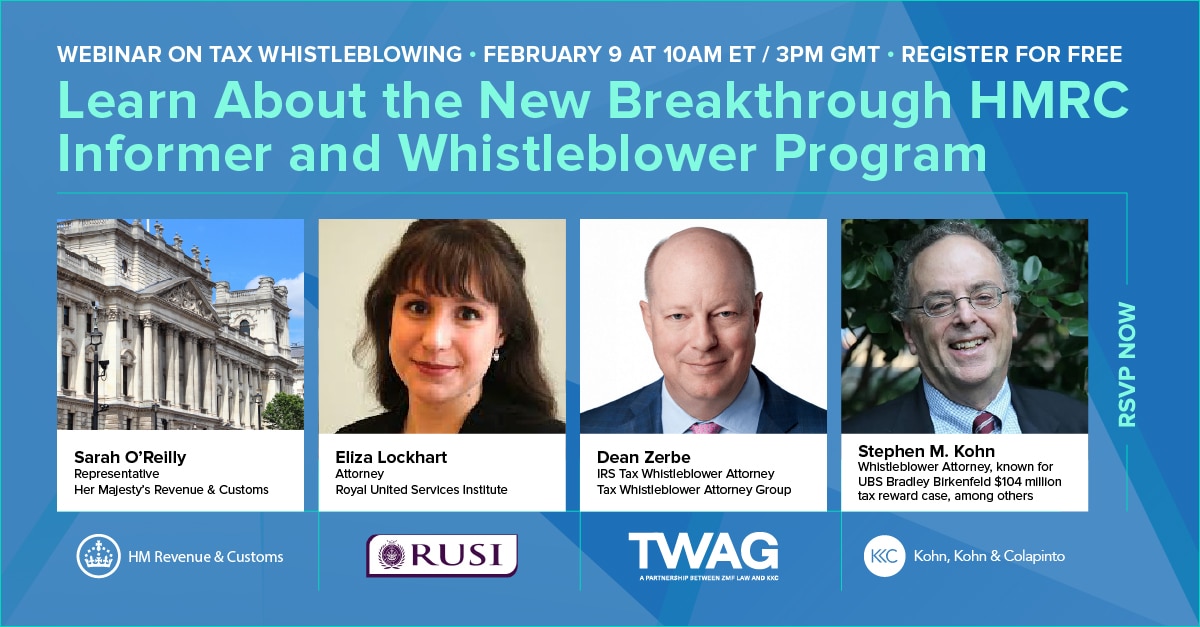May 14, 2025

This information is provided for educational purposes only by Kohn, Kohn & Colapinto and does not constitute legal advice. No attorney-client relationship is created by accessing this content. Laws and regulations may change, and this material may not reflect the most current legal developments. If you believe you have a whistleblower claim, consult a qualified attorney to discuss your specific circumstances.
An IRS whistleblower is someone who provides information to the Internal Revenue Service (“IRS”) regarding a violation of U.S. tax law. Violations might include criminal or non-criminal tax evasion, fraud, or other illegal activities. An IRS whistleblower might include an employee of a company, a business partner, or an individual who files a claim against a family member, client, accountant, lawyer, or other entity for intentionally evading taxes using deceit.
Intentions of an IRS Whistleblower
Why might an IRS whistleblower report tax noncompliance you might ask? There are several motivations for someone to report tax fraud:
- Moral and Ethical Concerns: most individuals believe it’s wrong for people or corporations to avoid paying their fair share of taxes. They might feel a sense of duty in reporting.
- Financial Gain: the potential for a substantial reward can be a strong incentive. In fact, regulators claim it’s one of the most significant incentives for enforcement.
- Revenge or Retribution: in some cases, whistleblowers might have personal grievances against the individual or company they are reporting, such as an ex-husband or partner.
- Fear of Retaliation: sometimes, employees are aware of illegal activities but fear for their job security if they don’t report it.
Deciding to become a whistleblower is a complex decision with ethical implications. Before blowing the whistle, one might ask, “will exposing tax fraud benefit society as a whole?” and “will I be prepared to help the IRS during an investigation?”
Who’s Eligible to Be an IRS Whistleblower?
Individuals with credible information regarding tax fraud or evasion are eligible. However, these individuals must be able to provide specific details about an illegal activity. For example, they must supply the IRS with email communications or documents proving, without a doubt, that someone intentionally underreported income.
It’s important to note that employees of the IRS, government contractors, or individuals with other legal obligations may be ineligible, given their relationship to the federal government. It’s important to note that other circumstances may vary, so it’s best to consult with an attorney if you’re unsure.
How Does an IRS Whistleblower Report Claims?
Individuals can submit a claim using IRS Form 211, Application for Award for Original Information. This form should include a description of the alleged tax violation, with an explanation.
And as stated above, you must provide the IRS with ample evidence, which may include financial records such as “books,” bank records, contracts, emails, or other evidence. And if you cannot supply physical proof, an overview of where the IRS might be able to find such documents can work.
During the claims process, an IRS whistleblower will also need to clearly articulate how they became aware of the violation, their relationship to the individual or entity in question. This form is finalized with a signature, signed under penalty of perjury.
While it’s not required to have an attorney to file an IRS whistleblower claim, it is highly recommended. IRS whistleblower cases are complex, and oftentimes negotiation is required when awards are being decided. Not to mention, an attorney can help minimize risk and keep your identity hidden from the public.
Rewards and Protections for IRS Whistleblowers
IRS whistleblowers can receive between 15 and 30 percent of the monies collected in a successful enforcement, based on the information provided to the IRS. These awards are issued upon final determination. Percentages vary depending on a few determining factors, including the quality of information provided, level of cooperation, and case complexity.
How Does an IRS Whistleblower Qualify for An Award?
To qualify for the IRC section 7623 (b) award program, the information must:
- Relate to a tax noncompliance matter in which the tax, penalties, interest, additions to tax, and additional proceeds in dispute exceed $2,000,000; and
- Relate to a taxpayer, and for individual taxpayers only, one whose gross income exceeds $200,000 for at least one of the tax years in question.
This includes taxes, penalties, and other interests. It’s also possible for multiple whistleblowers to report the tax noncompliance. In such cases, award amounts can be split amongst several whistleblowers with the amounts granted to each person decided by the IRS.
Don’t forget, whistleblowers are also taxed on awards as ordinary income! There are no deductions, but legal fees may be deducted under certain circumstances. It’s best to consult with a tax attorney to better understand your tax obligations a bit better.
Protection Against Retaliation
Unlike the SEC and CFTC whistleblower programs, whistleblowers are unable to file claims anonymously. However, the IRS has a strong reputation for protecting the identity of whistleblowers who report tax noncompliance. They also offer protection against retaliation. The Taxpayer First Act provides these protections, mainly to employees who report the underpayment of taxes to the IRS.
What’s more, IRS whistleblowers who encounter retaliation can file an additional lawsuit for back pay, damages, reinstatement, and more. However, given the complexity of such lawsuits, it’s best they work with an attorney for a successful outcome.
Types of Tax Noncompliance
There are many different types of tax noncompliance an IRS whistleblower may decide to report. Below is a common list (with categories) of possibilities:
Individual Tax Fraud
- Underreporting income: failing to report all income, including wages, self-employment income, and other sources.
- Claiming false deductions: taking deductions for personal expenses or overstating business expenses.
- Offshore tax evasion: hiding assets or income in foreign accounts.
- Failing to file tax returns: avoiding tax obligations by not filing required returns.
Corporate Tax Fraud
- Inflating deductions: claiming excessive or false business expenses.
- Transfer pricing abuse: manipulating prices between related companies to reduce tax liabilities.
- Tax shelters: using complex financial arrangements to avoid paying taxes.
- Offshore tax evasion: shifting profits to foreign subsidiaries to avoid U.S. taxes.
Other Tax Fraud
- Payroll tax fraud: misclassifying employees as independent contractors to avoid payroll taxes.
- Sales tax evasion: underreporting or failing to collect sales tax.
- Excise tax evasion: failing to pay taxes on specific goods like alcohol, tobacco, or gasoline.
This is just a list of the most common types of tax noncompliance. There are even instances where individuals or businesses underpay their taxes without even knowing it. This may be due to mathematical errors, misunderstandings, or delays. The key is that this underpayment is not intentional, whereas tax evasion (or avoidance), most of the time is quite intentional.
Tax evaders find new ways of avoiding taxes every day. If you have a question regarding a suspicious tax situation, we advise you to get in touch with our firm for a free consultation – there’s no fee unless we can get a recovery for you.
Our Firm Can Help
With a proven track record of securing hundreds of millions of dollars in IRS whistleblower rewards, Kohn, Kohn & Colapinto LLP is the undisputed leader in this field. If you possess knowledge of significant tax fraud or evasion, we urge you to contact us for a confidential consultation. Our experienced team is ready to protect your identity and maximize your potential reward.
Our Firm’s Cases

$104 Million Reward
As an international banker at UBS in Switzerland, Bradley Birkenfeld exposed a massive tax evasion scheme, leading UBS to disclose over 4,450 U.S. tax evaders and pay a $780 million fine to the IRS. He was awarded $104 million by the IRS for his information.

$98 Million Award
The tax whistleblower exposed major international illegal tax schemes for offshore banks. This whistleblower’s allegations led to 387 US payers getting caught red-handed, having stashed millions in illegal offshore accounts.

$100 Million Exposed
Alex Cherpuko, a 21-year-old whistleblower at the time, exposed a $100 million criminal enterprise, securing a $69.6 million judgment and becoming the first to simultaneously use False Claims Act, Dodd-Frank Act, and IRS whistleblower laws.
Relevant FAQs
Latest News & Insights
January 27, 2026





